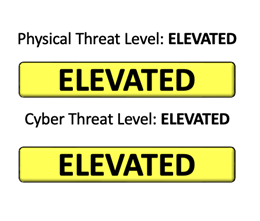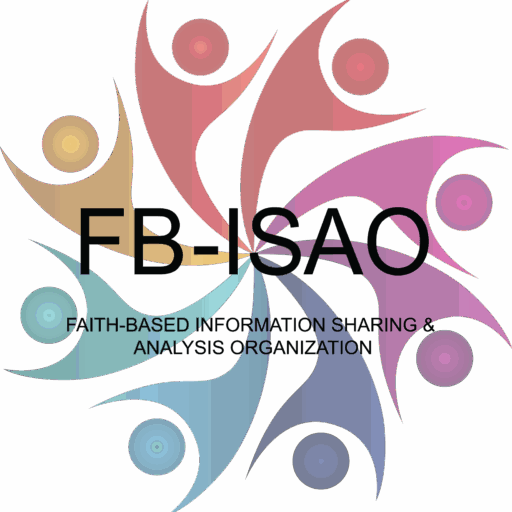Faith-Based Security Headlines
These updates are shared to help raise the situational awareness of Faith-Based organizations to best defend against and mitigate the impacts from all-hazards threats including physical security, cybersecurity, and natural disasters.
FB-ISAO Update and Share Zoom on Geopolitical Events Occurring
Join FB-ISAO today June 18th from 2:45-3:30 ET (11:45-12:30 PT) to discuss ongoing Geopolitical events. This is a MEMBER only event.
The discussion will center around the ongoing escalation in the Middle Easte, and what the potential domestic impacts for faith-based organizations. We have previously reported on NYPD increasing security around Jewish sites, and our next update examines some of the cybersecurity implications of the conflict.
Members are invited to participate in the conversation to share their concerns, as well as what their information needs are. This is a time to identify ways in which FB-ISAO can assist the community, as well as to outline what Houses of Worship may need from local government and cross-sector partners.
US Critical networks are prime targets for cyberattacks. They’re preparing for Iran to strike
Critical infrastructure information sharing groups are sounding the alarm about the increase in cyber threat because of escalation of hostilities in the Middle East. There has observations of spikes in cyberattacks against sectors such as energy with some attacks attributed to the Iranian-affiliated group “Cyber Av3ngers.” Information sharing networks across industries have begun to send out messages alerting to the potential Israel-Iran cyber spillover. We have previously shared in FB-ISAO Slack an alert from DHS referencing the potential increase for hacktivists dedicated denial of service (DDoS) attacks in reference to the escalated military action between Israel and Iran. While no major disruptions have been reported so far the Trump administration is monitoring the situation closely as Trump weighs how heavily to assist Israel.
Other sectors affected by the Israel/Iran conflict, including transportation and telecommunications, are experiencing impacts, though these are not necessarily cyber-related attacks. Some shipowners are opting to steer clear of the strategically important Strait of Hormuz, according to the world’s largest shipping association, reflecting a growing sense of industry unease as the Israel-Iran conflict rages on.
Analyst Comments: The recent surge in Iranian-linked cyber activity highlights the growing risk to U.S. critical infrastructure amid geopolitical tensions. These attacks reflect not only retaliation for Israeli military actions but from Iran in the cyber domain. While the U.S. has not yet seen catastrophic damage, the pattern of targeting vital systems especially those tied to public utilities and communications underscores the need for organizations to immediately step up their cyber defenses, while increasing long term investments in cyber resilience. Strait of Hormuz
Faith-based institutions, particularly those within the Jewish and Muslimas community should also remain vigilant, as they may face digital threats and online harassment. Security awareness, incident response planning, and collaboration with local and federal agencies are vital to mitigating these risks. Security awareness, incident response planning, and collaboration with local and federal agencies are vital to mitigating these risks.
Maryland Man Charged With Mailing Threatening Communications to Jewish organizations, Including a Jewish Institution in Philadelphia
A Maryland resident, identified as a 55-year-old, has been arrested and federally charged with mailing threatening letters to Jewish organizations including one in Philadelphia over a period starting around March 1, 2024. The correspondence, often typewritten, referenced Gaza, Israel, and historical violence against Jewish people, warning recipients they might face similar threats. One ominous letter stated the institution’s many large windows would soon need to be “rebuilt” after being “physically destroyed”. The FBI’s offices in both Philadelphia and Baltimore are investigating, and the suspect now faces charged for mailing threatening communications targeting Jewish organizations.
Analyst Comments: This case highlights the persistent threat facing faith-based institutions, particularly Jewish communities, amid rising global tensions and antisemitic rhetoric. The deliberate targeting of multiple Jewish organizations with charged measures illustrates how international conflicts can incite domestic hate and motivated actions. The use of physical mail to deliver threats suggests calculated intent to instill fear. Faith-based intuitions that may be at a heightened risk should take a layered approach to security.
- Establish a Security Plan
- Develop and routinely update an emergency preparedness and threat response plan
- Include specific protocols for handling suspicious mail or packages
- Partner with Law Enforcement
- Build direct lines of communication with local police departments and FBI field offices
- Train Staff and Volunteers
- Offer regular training on how to recognize threats
- Conduct active threat drills and lockdown exercises
- Enhance Physical Security
- Install surveillance cameras, reinforced doors, and secure mailrooms or delivery areas
- Use access control systems to monitor who enters and exits the premises
Germany sees sharp rise in incidents of Islamophobia
Germany has seen a significant and troubling surge in Islamophobic incidents, especially since October 2023. A knife attack on Hamburg city bus left four people injured after a man demanded passengers’ smartphones and was confronted. Police are investigating the incident, which follows a May stabbing at the central station. According to the CLAIM network, a record 1,926 anti-Muslim incidents occurred in 2023, a staggering 114% increase from the year before with verbal attacks being most common, while 178 involved physical violence such as attempted arson attacks on mosques and even shootings. Germany recorded a sharp rise in anti-Muslim incidents in 2024, with over 3,000 cases up 60% from 2023 linked to post October 7th tensions. The spike in Islamophobic hate has been linked to geopolitical tensions, notably following Hamas’s October 7 attack on Israel, which exacerbated anti-Muslim sentiment amid intensified political and media discourse.
Analyst Comments: The Hamburg bus stabbing and the broader rise in anti-Muslim incidents reflect growing tensions and public safety concerns across Germany. The 60% surge in Islamophobic attacks many targeting women, individuals, mosques, and community groups underscores how geopolitical events can fuel domestic hate and violence. For faith-based institutions especially Muslim communities this climate presents both physical and emotional challenges. Faith-based institutions should review and strengthen security protocols, enhance coordination with local authorities and encourage reporting of threats or harassment.
Get the Daily Awareness Post Delivered to your Email!
More Faith-Based Stories
St. Mark’s Cathedral opens doors to protesters seeking safety after shooting
MN suspect tied to Christian group that warned of ‘demon-possessed politicians’
Milwaukee Temple Menorah building vandalized; man charged
NY: Police: Man caused disturbance at Mineola church, broke religious statues worth $10,000
VA: LGBTQ Pride Message On VA Church Sign Smashed By Vandals
OR: Rural church in Clackamas County vandalized over welcoming LGBTQ+ community, leaders say
MI: Police seek info after Pride flags vandalized at two Petoskey churches
Congregation stays hopeful after fire damages historic church in Copperas Cove
CA: Antisemitic Attack Reported in Marina District Early Saturday Morning
NYPD searching for elderly cane-wielding thug who beat woman in apparent antisemitic subway attack
Ohio: Faith leaders calling for release of ICE detainee taken from parking lot of East Price Hill Kroger
10 years after Charleston church massacre, faith leaders lament that the country hasn’t changed
Attorney General Pam Bondi vows to preserve religious freedom against ’emerging threats’
Religious Liberty Commission examines imperiled Native American sacred site, mandatory reporter law
Armed man arrested at Nashville’s ‘No Kings’ protest had long fascination with Nazis, mass murder
Protests: On July 17th, March in Peace. Act in Power & No Kings protest organizers announce July 17 as next demonstration
Khamenei to Trump: Iran will not surrender
Live updates: Iran warns Trump of ‘irreparable damage’ if US joins conflict
Mapping the conflict between Israel and Iran
Rounds of severe storms to continue in central and eastern US
23andMe ‘failed to take basic steps’ to safeguard customer data
DMV-Themed Phishing Campaign Targeting U.S. Citizens
More Security-focused Content






